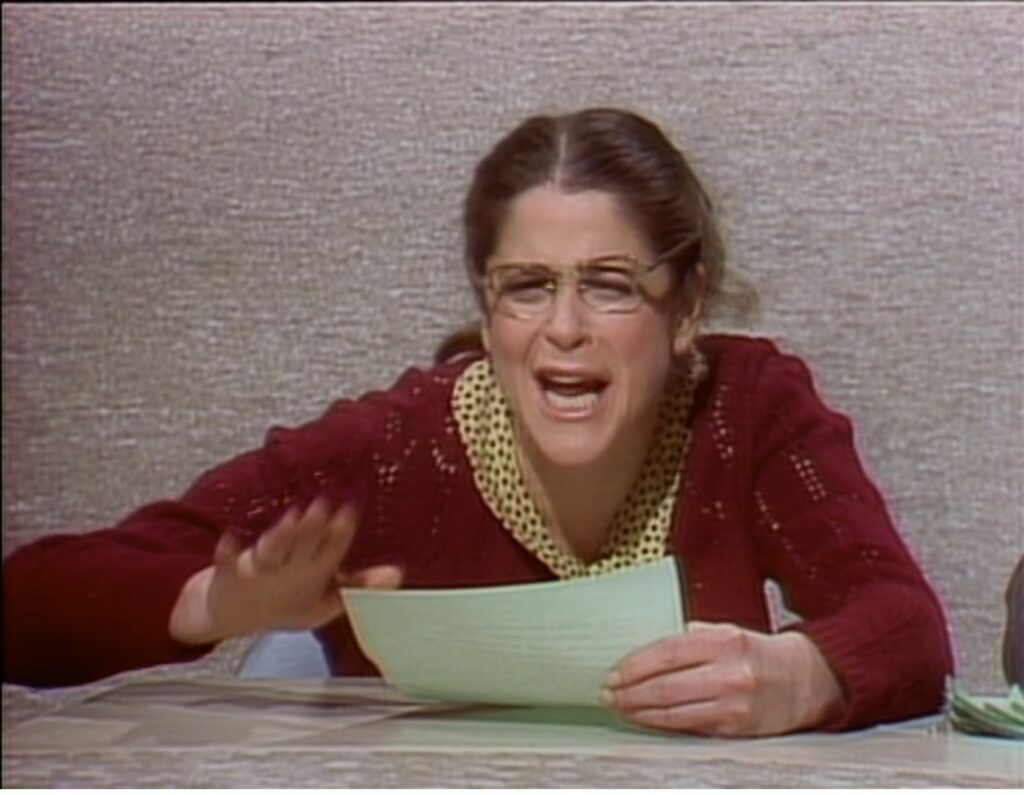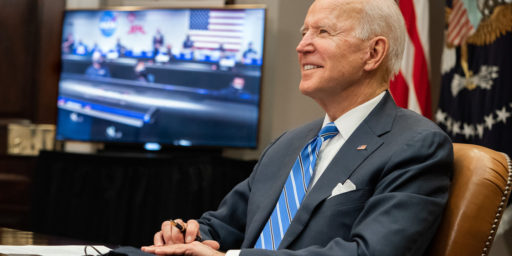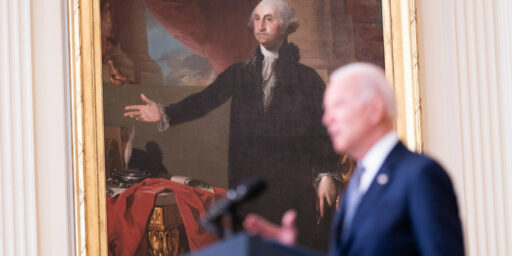Biden Reverses Himself on Infrastructure Linkage
When he said he wouldn't sign it if it wasn't accompanied by a second bill, he wasn't implying that he would veto it if it wasn't.

For the third time in as many days, President Biden issued a contradictory statement regarding a “bipartisan” infrastructure deal.
WaPo (“Biden reverses himself on infrastructure, says he would sign bipartisan deal“):
President Biden on Saturday reversed a stand he had taken forcefully just two days earlier, saying he will sign a roughly $1 trillion bipartisan infrastructure package even if he is unable to bring his party together for a separate bill that includes other Democratic spending priorities.
On Thursday, Biden declared that he would sign the two bills together only. “If this is the only thing that comes to me, I’m not signing it,” Biden said of the bipartisan compromise. “It’s in tandem.” But on Saturday, he said, “I gave my word to support the infrastructure plan, and that’s what I intend to do. . . . I fully stand behind it without reservation or hesitation.”
Biden’s switch came after Republicans bitterly complained that he had made it appear that they’d effectively signed off on a strategy that allowed the president to have a bipartisan infrastructure measure along with a much bigger Democrats-only spending package that he refers to as the American Families Plan.
NYT (“‘Not My Intent’: How Biden’s Impromptu Comments Upended a Political Win“):
It was all going according to President Biden’s tightrope plan to pass the most ambitious economic agenda in generations. Right until the moment that Mr. Biden, a politician with a history of rogue comments, veered off script.
After weeks of closed-door negotiations, Mr. Biden strode to the cameras on the White House driveway on Thursday, flanked by an equal number of Democratic and Republican lawmakers, to proudly announce an overall infrastructure agreement totaling $1.2 trillion over eight years that could cement his legacy as a bipartisan deal maker.
Mr. Biden and his top aides had successfully struck a limited agreement with key centrist senators to rebuild roads and bridges while carefully signaling to liberals that he still intended to embrace a measure — likely to gain only Democratic support — to spend trillions more on climate, education, child care and other economic priorities. It was an “I told you so” moment for a president who is supremely confident in his ability to navigate legislative negotiations.
But in a stray comment during a news conference an hour later, the president blurted out that he would not approve the compromise bill without the partisan one.
“If this is the only thing that comes to me, I’m not signing it,” he said, answering a question about the timing of his legislative agenda. “I’m not just signing the bipartisan bill and forgetting about the rest.”
It may not seem like much, but it was enough to upend Mr. Biden’s proud bipartisan moment. On the one hand, he was saying out loud what liberals in his party wanted to hear. But to the centrist senators and Republicans, it made explicit a notion that had only been hinted at before — that Mr. Biden not only intended to sign a second, more ambitious package, but that he would also go so far as to veto their bipartisan plan if the larger bill did not materialize.
NPR (“Biden Walks Back Threat To Block Infrastructure Deal Over Democratic Priorities“):
President Biden is walking back a threat that he won’t sign a bipartisan infrastructure deal the White House reached with senators if it’s not paired with another larger spending plan supported exclusively by Democrats.
Republicans themselves threatened to walk away from the bipartisan deal after Biden explained during a press conference that the bipartisan effort needed to be passed in tandem with a broader plan that GOP lawmakers strongly oppose.
From Biden’s most recent statement:
I have been clear from the start that it was my hope that the infrastructure plan could be one that Democrats and Republicans would work on together, while I would seek to pass my Families Plan and other provisions through the process known as reconciliation. There has been no doubt or ambiguity about my intention to proceed this way.
At a press conference after announcing the bipartisan agreement, I indicated that I would refuse to sign the infrastructure bill if it was sent to me without my Families Plan and other priorities, including clean energy. That statement understandably upset some Republicans, who do not see the two plans as linked; they are hoping to defeat my Families Plan—and do not want their support for the infrastructure plan to be seen as aiding passage of the Families Plan. My comments also created the impression that I was issuing a veto threat on the very plan I had just agreed to, which was certainly not my intent.
So to be clear: our bipartisan agreement does not preclude Republicans from attempting to defeat my Families Plan; likewise, they should have no objections to my devoted efforts to pass that Families Plan and other proposals in tandem. We will let the American people—and the Congress—decide.
The bottom line is this: I gave my word to support the Infrastructure Plan, and that’s what I intend to do. I intend to pursue the passage of that plan, which Democrats and Republicans agreed to on Thursday, with vigor. It would be good for the economy, good for our country, good for our people. I fully stand behind it without reservation or hesitation.
Some other Democrats have said they might oppose the Infrastructure Plan because it omits items they think are important: that is a mistake, in my view. Some Republicans now say that they might oppose the infrastructure plan because I am also trying to pass the American Families Plan: that is also a mistake, in my view. I intend to work hard to get both of them passed, because our country needs both—and I ran a winning campaign for President that promised to deliver on both. No one should be surprised that that is precisely what I am doing.
I still don’t really understand what purpose a “compromise” bill serves if the entire package is simply going to be passed through reconciliation. But I suppose there’s some signaling value to passing the less controversial parts with Republican votes—presuming there are actually enough of them to do so.
Given that it will take 51 votes—every Democratic or Democratic-caucusing Senator plus Vice President Harris—to pass the remaining measures through reconciliation, it’s not obvious that it will pass. Are Joe Manchin and Krysten Sinema on board? Linking the two as was done in the previous message just made no sense and seemed to upend whatever “bipartisan” spirit was achieved by the one-two.






I confess I have no idea what everyone is getting so agitated about. Biden will sign two bills, or none. Surely this is not hard to understand.
James, I’ll ask the same questions I asked yesterday. The bill has five Republican Senators who have publicly stated they will vote for it. Who do you think are the five additional Senators who will vote for it but are keeping that fact secret? And why are they keeping it secret?
From what I’ve been able to ascertain, Manchin is on board with a reconciliation bill, but I’m not sure about Sinema, who has been very quiet on that subject.
In the end, there will be one infrastructure bill (maybe) passed under reconciliation, since there weren’t 10 R’s that would support the compromise.
@MarkedMan: The 11 Republican senators who originally declared they would support the bill were Richard Burr, of North Carolina; Bill Cassidy, of Louisiana; Susan Collins, of Maine; Lindsey Graham, of South Carolina; Lisa Murkowski, of Alaska; Rob Portman, of Ohio; Mitt Romney, of Utah; Mike Rounds, of South Dakota; Thom Tillis, of North Carolina, Todd Young, of Indiana, and Jerry Moran, of Kansas. This has ben widely reported and I don’t know why people keep asking about it.
@Ken_L: Those Republicans did not endorse the plan. They said they were looking forward to working on a plan.
I think Biden shouldn’t have made the linkage in the first place. Pelosi had already said the house would pass both or neither so that commitment already served to shore up moderate Dems. Biden should just have stayed silent and let Pelosi take the heat and do his bidding.
@SteveCanyon: It didn’t matter what Biden said or did. The Republican leadership was going to quash this no matter what. You’re confusing an excuse with a reason.
@MarkedMan: That the Republicans were going to renege either way is exactly the reason by Biden’s statement was I’ll conceived in the first place. There might have been some leverage for 2022 in having a “bipartisan” bill torpedoed by the very people in the GOP who worked for its passage, but the events as they developed simply reinforce the old “you can’t negotiate with liberals/socialists/people who hate our country” piano that Rush started playing back in 1980-whenever.
It lets Manchin and Sinema continue their off-Broadway revival production of Roger and Hammerstein’s Bipartisanship
Last evening I checked a couple of headline new sites to see what reporting there was on TFG’s rally and found nada. That I find interesting. Not enough people cared for articles on it to have enough clicks to rise to prominence.
It lets Manchin and Sinema continue their off-Broadway revival production of Rodgers and Hammerstein’s Bipartisanship
Josh Marshall sums this up pretty well:
@Just nutha ignint cracker:
He said the same thing he’s been saying all along. He was saying what was necessary to keep the Democrats on board.
And, look, this statement doesn’t matter in and of itself. It just happens to be what Mitch decided to hang his obstructionism on. If, for whatever reason, Biden hadn’t happened to repeat this at this particular moment, some of his other words would have been used, or it would have been discovered that some highway extension was going to go through a Confederate park, or that it requires Mr. Potatohead to undergo a sex change operation. Mitch was always going to kill this, and he was always going to find some excuse, no matter how lame, to blame it on Biden, or OAC or that scary black woman, Stacy Abrams. Full stop, end of story.
It bugs the hell out of me that despite these scenarios being all but carved in stone ahead of time, the gullible media falls for them over and over and over.
@Sleeping Dog: I saw a headline at MSN last night claiming that FG was saying that he was “saving American democracy,” but I’d gotten enough of a laugh from the headline that I didn’t bother with the article.
As much as I respect our host, I do find it quite amusing to see such an intelligent man be so completely played by the Republicans here.
Biden didn’t negotiate in bad faith, and he hasn’t reversed himself at all. He says now as he has said all along that he expects to sign both a bipartisan infrastructure bill and a reconciliation bill. Nothing has changed. And since Nancy Pelosi has made it clear that the House won’t send him the bipartisan bill without the reconciliation bill, whatever he now says to soothe the wounded feelings of snowflake Republicans can’t change a thing. And yet JJ, like (to be fair) a press corps desperate to write of Dems in Disarray! acts like there have been severe and tangible changes over the last couple of days.
There are five Republicans who are committed. There are six more who have said they are open to negotiate but wouldn’t publicly commit. Those six all have needs within their states to exhibit a pretense toward bipartisanship. If push comes to shove McConnell would let at most four of them vote in favor, guaranteeing defeat. But push won’t come to shove. If those six had any real intention of buying in they would have been standing with the original five.
@MarkedMan: I think that’s splitting hairs. As yet there is no actual bill to support or not support. There were reportedly 21 senators committed to a ‘framework’ which an inner group of 10 had negotiated with the White House.
@Ken_L: Sure, those 6 Republicans are committed to the “Framework”. I’ll even concede they want it to pass, maybe because they need concrete proof of bipartisanship in order to survive reelection, or perhaps because they actually give a shit about their state. But as of right now they are getting credit for bipartisanship without really having skin in the game.
Here’s the only question that matters: will Mitch allow enough of them to vote with the Dems in order for the bill to pass?
As far as I know, none of the six are close to the Republican leadership or could be considered to be representing that leadership in the negotiations. None of the Republican leadership themselves has had anything positive to say about the deal. Look, I could be wrong. Lord knows I’ve been wrong lots of times. But I just don’t see anything that indicates those 11 votes are really there.
And now, hilariously, all the Republicans who claimed to be so wounded when Biden reiterated the truth of his plans are all back on board now that the president has used slightly different words to say exactly the same thing…
46 should never go off script, he has little idea what he’s saying to begin with and needs the telly more than 44 ever did. Imagine what his handlers have to deal with on a daily basis, it’s the stuff of nightmares.
I imagine that Biden is aware of and remembers the way R “moderates” negotiated on the ACA for what? most of a year? He was VP then.
Bad faith negotiation seemingly designed to delay and thwart. By design and effect.
Lucy and the football. Best bet is too ignore Lucy entirely. Lucy is a sociopath. When someone has a proven record of saying they will do something then flaking, DO NOT TRUST THEM!